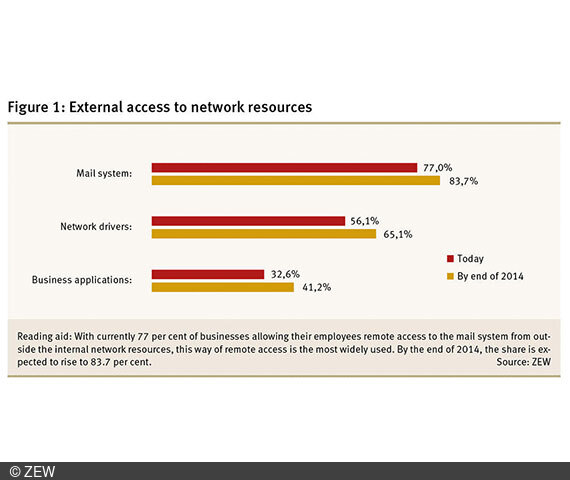Information Economy - More and More People Are Able to Work Outside the Office
Information EconomyLocation-independent working is on the rise. Thanks to modern communication technologies, an increasing number of people are able to carry their work with them wherever they go, allowing them to be of service to their clients, colleagues and superiors no matter where they are. A representative business survey in the information economy concluded by the Centre for European Economic Research (ZEW) shows that such statements are no longer visions, but have become real.
According to the findings of ZEW, four out of five businesses in the information technology sector (IT, media, and knowledge-intensive service providers) already allow their employees access to internal business network services from an external IP. This development rapidly continues to gather momentum. By the end of 2014, an increase to over 85 per cent is expected. "The results of our survey show that businesses in the information economy increasingly take advantage of the opportunities that have opened up through laptops, smartphones, and the rapid spread of public WLAN access points. Hence, mobile and location-independent working as an essential element of modern knowledge-based society becomes a reality for a continuously increasing number of employees", says Dr. Jörg Ohnemus, researcher in ZEW’s Research Department "Information and Communication Technologies".
In most cases, the business offers its employees access to the internal mail system, e.g. via a web interface. Already today, the share of businesses offering their employees such a remote access amounts to 77 per cent (see figure 1). By the end of 2014, information economy businesses expect a further increase to about 84 per cent.
As of today, about 54 per cent of the businesses facilitate employees' access to digital documents from outside the company. The share of businesses to follow suit is expected to rise by 9 percentage points in the coming year and a half to presumably about 65 per cent.
With about one third, the proportion of businesses allowing an external use of programs and applications is the lowest. However, the proportion is expected to rise here as well, namely to about 41 per cent by the end of 2014. Thereby, the findings unfold significant differences when taking the size of the companies into account (see figure 2). Whereas today already about 74 per cent of large businesses with 100 employees and more offer employees remote access to programs and applications, the share of smaller businesses is substantially lower with 27 per cent (5 to 19 employees) and 47 per cent (20 to 99 employees). However, a general increase of these proportions is to be expected across all size classes.
For further information please contact
Dr. Jörg Ohnemus, Phone +49 621/1235-354, E-mail ohnemus@zew.de
ZEW’s Information Economy Business Survey
About 5,000 businesses with a minimum of five employees participate in the quarterly survey conducted by ZEW. The companies surveyed belong to the following business sectors: (1) ICT hardware, (2) ICT service providers, (3) media, (4) law and tax consultancy, accounting, (5) public relations and business consultancy, (6) architectural and engineering offices, technical, physical and chemical analysis, (7) research and development, (8) advertising industry and market research, (9) other freelance, academic and technical activities. Combined, all nine sectors make up the economic sector of the information industry. The ICT sector consists of ICT hardware and ICT service providers. The last six sectors make up the knowledge-intensive service providers.
Overview of the ZEW economy survey (German language only)
